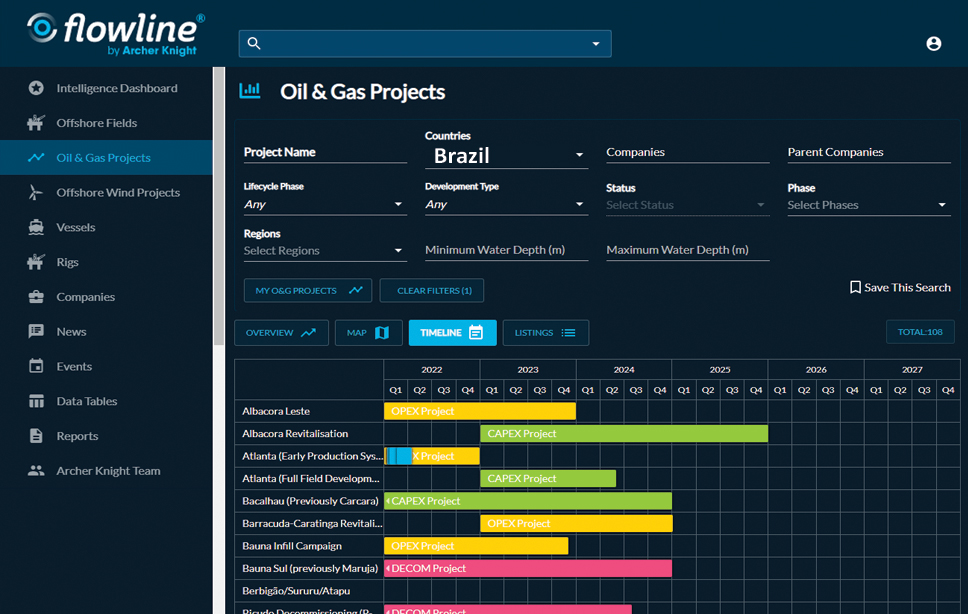5 min read
Investing in Oil and Gas: How the UK Stacks Up Against a Global Business
![]() Archer Knight
:
August 23, 2024
Archer Knight
:
August 23, 2024

Investing in the exploration and production (E&P) of oil and gas is a delicate balance between opportunity and risk, governed by economics and politics. Companies must meticulously assess where to allocate their capital to maximise returns while minimising exposure to potential setbacks. They seek regions with abundant and accessible hydrocarbon reserves, ensuring that the cost of extraction is outweighed by anticipated profits. Let’s explore the key factors influencing these decisions and how the UK compares on the global stage.
1. Prospectivity
Basins around the world vary in the quantity and quality of hydrocarbons they contain, as well as the likelihood that any discovery will be commercially viable. Exploration often begins with wildcatting, where the geology is not well understood, leading to a low success rate. However, the targeted structures are typically large, so discoveries tend to be significant. As more wells are drilled and the basin matures, the geological understanding improves, leading to a higher success rate. However, over time, the targets decrease in size, as the larger structures are drilled first. This process continues throughout the basin's life, with success rates increasing, field sizes decreasing, and a lower percentage of the fields being economically viable to produce.
2. Political and Regulatory Stability
The political landscape is a critical factor in investment decisions. E&P companies are cautious about investing in countries with volatile political environments or inconsistent regulatory frameworks, as these can lead to abrupt changes in operational conditions or even expropriation of assets.
3. Operating Environment
The ease with which hydrocarbons can be discovered and produced is a key economic factor in determining whether to invest. Fields located in harsh environments or where drilling is difficult need to yield higher margins to justify taking the associated risks.
4. Cost of Production
The key to the economics of hydrocarbon production is the cost per barrel. While the operating environment and regulatory regime heavily influence this cost, the number of barrels produced is often the most significant factor. A high production rate can offset various economic and operational challenges.
5. Infrastructure Availability
The first consideration when exploring for oil and gas is whether any discovery can be brought to market. This often involves assessing whether there is capacity in nearby pipelines or whether the field is large enough to support standalone export facilities, such as a floating production system or a new pipeline. The UK currently has considerable oil and gas infrastructure, allowing many smaller fields to be developed by sharing existing facilities. These small fields either pay a tariff to or share the costs with the infrastructure owner, often extending the host field's life and increasing its reserves.
How Does the UK Continental Shelf (UKCS) Stack Up as an Investment Proposition?
1. Prospectivity
The UKCS, apart from the West of Shetland (WoS), is mature, so the chances of finding a large field are small. However, the geology is well understood, and innovative geologists might still identify viable targets, though this is becoming increasingly difficult.
2. Political and Regulatory Stability
The UK has a stable government that honours contracts and operates within a robust legal framework. However, it has a complicated and unstable fiscal system, with successive governments frequently altering it. The recent proposal to increase the Supplementary Charge Tax (SCT) from 75% to 78% and reduce capital allowances is just the latest in a long line of adjustments. It’s challenging to assess the viability of a project when the fiscal regime you will face at the time of production is uncertain. Many countries that might be perceived as less stable offer oil companies fiscal stability, guaranteeing the fiscal terms in place when the licence is signed for the project's duration.
3. Operating Environment
The North Sea is a harsh environment, with the WoS being even more so, by any measure the UKCS is among the most challenging in the world.
4. Cost of Production
In the UK, with fields reaching the end of their life and being decommissioned, we can deduce that their cost per barrel has reached the $80/barrel level, which has been the approximate oil price for the last few years, triggering the abandonment decision. However, even as recently as a decade ago, the giant Buzzard Field was producing its plateau of 200,000 barrels a day at a cost of well under $10/barrel. As existing fields decline, only a few newer, higher-producing fields will operate at margins capable of surviving the next oil price crash (the average cost per barrel in the UK is currently around $40/barrel).
5. Infrastructure Availability
There is still considerable infrastructure in place, but it is disappearing at an ever-increasing pace. Industry and government have worked well together to maximise its use for third-party production. The UK also has a world-class oil field supply chain, which already does more business overseas than in the UK. As UKCS production declines, it is crucial to support the export effort and continue to innovate, or we can expect large sections of this economic asset to move elsewhere.
Conclusion
While the UK is politically stable and benefits from considerable infrastructure, it presents a challenging environment for oil and gas investment. The combination of high costs, high taxes, and an unstable fiscal regime, coupled with declining exploration potential, makes attracting investment increasingly difficult. When the government also proposes to raise taxes and restrict licensing, the investment landscape becomes even less appealing.
The current proposals to increase the tax burden, remove capital allowances designed to encourage investment, and halt the issuance of exploration licences will accelerate the decline in production. This decline could outstrip the reduction in consumption, leading the UK to rely more heavily on imported oil. We are already aware of several operating companies whose presence is important to the future of the UKCS who have substantially decreased their capital spending plans in anticipation of the changes to the fiscal regime. If the rhetoric that is coming from the government is enacted, we can expect this trend to accelerate and the opportunities to use local oil and gas in the energy transition will disappear as decommissioning continues apace.
Without new capital investment, mature oil fields worldwide are generally expected to decline at a rate of around 15% to 20% per year. If we assume a conservative 15% pa, UK production will drop from the current level of approximately 1.3 million barrels of oil equivalent (oil and gas) per day (boepd) to around 450.000 boepd by the end of this decade. This leaves an additional 850,000 boepd that will have to be sourced elsewhere.
If no measures are taken to avoid this catastrophic decline and to allow sufficient time to develop renewable energy resources to replace our current oil and gas usage, the UK's balance of payments could be severely impacted when the next surge in oil prices occurs. In the meantime, tax receipts will decline, and the economic benefits of oil production will be transferred to other nations.
The UK has nurtured a robust and highly skilled oil and gas sector, yet it is clear that other regions, particularly in emerging markets, offer larger reserves, more favourable economic prospects, and governments more attuned to the needs of investors. While the allure of higher taxes may resonate with environmental aspirations, the unintended consequence could be a diminution of our own economic position, without delivering any reductions in global carbon emissions. Rather than advancing our environmental goals, we risk merely transferring our dependency to less transparent regions, where the environmental and economic outcomes are harder to control and where our ability to manage costs and secure supply becomes increasingly fraught with complexity. In this context, the careful calibration of fiscal and regulatory policies will be crucial to ensuring that the UK remains a competitive and responsible player in the global energy transition.
About the author
John Scrimgeour is a seasoned professional with over four decades of experience in the oil and gas sector. Currently serving as Chairman of Archer Knight (Holdings) Limited, John has played a pivotal role since 2019 in providing subsea market intelligence and consultancy services for the global oil, gas, and renewables industries.
Before joining Archer Knight, John held senior positions at Gneiss Energy and was a board member at the Oil and Gas Technology Centre, where he contributed to developing solutions for offshore mature basins, subsea, and decommissioning challenges. He also served as a board member of ONE Oil and Gas, focusing on ensuring a sustainable economic future for northeast Scotland.
Earlier in his career, John held leadership roles in various international locations, including Colombia, Gabon, Congo, and Tunisia, managing operations for companies such as Suncor Energy, Perenco, and CMS Nomeco. His expertise spans technical management, reservoir engineering, and country operations, making him a respected figure in the industry.
John's extensive background also includes a commitment to education and social responsibility, having served as Executive Director of the Aberdeen Institute for Energy and on the board of Aberdeen Foyer, a charitable organisation supporting at-risk youth.
To speak with John and find out more about Archer Knight, Energy Maritime Associates and their services, you can email him at jsc@archerknight.com

4 min read
How to manage energy transition in oil & gas
Done right, the move towards carbon neutral offers companies new and exciting opportunities. The industry is embracing the energy transition...

2 min read
Is Brazil poised to be a twin energy hub?
Renewables are taking the Latin American giant’s energy status to another level. Brazil is a major oil & gas economy, a role cemented in recent...

2 min read
Look Ahead 2021 – John Scrimgeour
John Scrimgeour, Archer Knight’s chairman, on what to look out for in 2021 What can we expect to happen in energy markets in 2021? No industry was...



